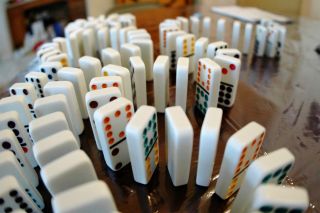Magical Thinking
Denying Determinism
Our natural and supernatural illusions of will
Posted January 31, 2014

Last semester I taught a new seminar on the psychology of free will. The upshot of the class—and of a wealth of recent research on the subject—was that the evidence in favor of free will is weak. We all have a profound sense that we are free agents, masters of our own fates who choose our actions on the basis of sound reasoning or, in some cases, mere whim. But however we come to our decisions, we have a strong sense that we are the ones doing the deciding.
The problem, of course, is that determinism seems to work so well in every other area of nature. The physical world appears to be quite lawful. As our knowledge of physics and chemistry have expanded, so has our ability to predict and control natural events. It all works quite well, making our lives increasingly predictable. If, on the other hand, our cars, groceries, and living room furniture were granted the freedom to act as they wish—in accordance with the laws of physics, or not—we would be faced with some serious challenges. Life would become random and chaotic.
So why is human behavior so special? Does it make sense that we alone should stand apart from the rest of nature? Is it reasonable to think that humans possess a non-material mind that makes decisions for the material body but is itself not caused or determined by anything else? A ghostly entity floating above the ordinary clockwork of biology and physics.
This is a question philosophers have struggled with for centuries, and I will not attempt to solve it here. But a few things are clear. First, the belief in a conscious free will is strong and widely held. When you wake up and decide what clothes to put on in the morning, it seems abundantly obvious that you were the one who decided. You chose the beige corduroy pants and the green sweater, but had you felt just a little differently, you might have chosen the plaid skirt and the white turtleneck. Even in Asian societies where we expect to find more collectivist attitudes and a diminished sense of individualism, belief in an individual conscious will is strong.
Furthermore, whether our sense of will is genuine or not, we like it. In most cases, we prefer to feel in control. If accused of wrong-doing, we may claim that we had no choice, lost control, or, for some other reason, were not really responsible. We shouldn’t be blamed. But most of the time, we seek a sense of agency and control. We want to be the masters of our own fates and to receive credit for the things we achieve. Part of that sense of mastery comes from the predictable nature of the world around us. The natural processes of the deterministic world are a comfort to us. When we move physical objects, they behave in ways we have come to understand and expect. The seasons, the waxing and waning of day, the movements of bodies of water all play out their roles as they have for as long as we can remember.
But sometimes the natural world disappoints us, and we turn to the supernatural. These breaks in the usual order are quite interesting, and there are enough examples to fill many blog posts. In the future, I will write about the use of miracles as evidence of god’s existence, the thrilling nature fictional characters with supernatural powers, and our feeling of awe and disbelief at the stage magician’s seemingly impossible accomplishments. All of these cases represent interesting breaks from the naturalistic world.
But for now let’s consider superstition, the primary topic of this blog. Superstition is another kind of denial of determinism. When the deterministic world fails to bring us the things we want with sufficient certainty, we turn to forces beyond standard physics. Often there is a causal chain of events, but we just can’t get ourselves into it with sufficient influence or certainty. For example, as we wait for the results of a medical test, we understand that there is a natural process that will result in either a positive or negative result. But this process is going on somewhere else, outside our range of vision, and, at this late stage of the process, we have no role in the chain of events. The disease has either been acquired or avoided, and there is nothing we can do about it now. It is too late for any natural process to have an effect. However, because we have a sense of will and prefer to feel as if we are in control, we are often willing to deny the deterministic nature of our predicament and turn to the supernatural for relief. If performing a superstitious ritual or wearing a lucky bit of jewelry on the day you receive the test results is going to have any effect on the outcome, we must be willing to deny the usual limitations of a scientific world. At least for a moment.
When we turn to superstition, we are using the sense of will over our behavior and the world around us—all of which may be an illusion in the first place—but in this case we are extending that sense even further than usual. Under normal circumstances, we have the illusion that we control parts of the natural world, and in most cases, our actions have expected and predictable effects. But when the deterministic world fails to guarantee us the things we want, we are likely to extend our illusory sense of will into places science says it cannot go. Much of the time, a predictable deterministic world serves us quite well, but when it falls short, we are quite willing to deny determinism and turn to magical means of influence.


